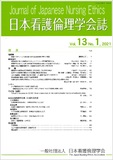Japanese
English
- 販売していません
- Abstract 文献概要
- 参考文献 Reference
本研究の目的は、看護学生の倫理的感受性質問票(ESQ-NS)と道徳的感受性テスト(MST)の比較によって、ESQ-NSの有用性を検討することである。平成27年4月から平成30年11月までの4年間の縦断調査を行った。反復測定による一元配置分散分析の結果、ESQ-NSの合計得点および、3つの下位因子中2因子「患者の意思尊重」(p<0.001)、「患者情報保護への配慮」(p<0.001)で有意差を認め、1年生に比べ他のすべての学年で平均値が高くなっていた。また、相関分析の結果、ESQ-NSとMSTの一部の下位尺度は有意な相関を示したことから、2つの尺度は類似した概念を測定しつつも、異なるものであることが示唆された。ESQ-NSは学年と有意に関連があり、高学年の学生は1年生に比べ高い倫理的感受性を示していることから、看護基礎教育の中で育成され向上していくと考えられている、学生の倫理的感受性を測定するツールとしての有用性を示したと考える。
The purpose of this study was to examine the usefulness of nursing students' ethical susceptibility questionnaire (ESQ-NS) by comparison using the Moral Sensitivity Test (MST). A four-year longitudinal survey was conducted from April 2015 to November 2018. As a result of repeated-measures one-way analysis of variance, the ESQ-NS showed a significant difference in the total score and two of the three sub-factors: “Respect for individuals” (p<0.001) and “Maintaining patients' confidentiality” (p<0.001). Correlation analysis also showed a significant correlation between ESQ-NS and MST. This means that while the two measures measure similar concepts, it was suggested that they were independent of each other. ESQ-NS was significantly associated with grade, with higher grade students showing higher ethical sensitivity than grade students. Therefore, we believe that ESQ-NS has shown its usefulness as a tool for measuring student ethical sensitivity considered to be nurtured and improved in basic nursing education.
Copyright © 2021, The Japan Nursing Ethics Associatin. All rights reserved.


